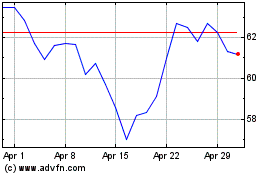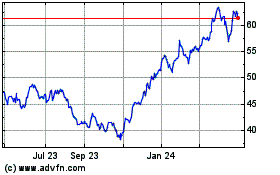Dalian Wanda Nears Higher Buyout Offer for Property Arm
May 05 2016 - 7:30AM
Dow Jones News
Chinese property-and-entertainment conglomerate Dalian Wanda
Group Co. is close to announcing a sweetened offer for its $4
billion-plus commercial-property arm buyout to woo investors, which
include sovereign-wealth fund Kuwait Investment Authority and China
Life Insurance Group Co.
Wanda, controlled by Chinese billionaire Wang Jianlin, is likely
to raise the offer for Hong Kong-listed Dalian Wanda Commercial
Properties Co. by about 10%, according to people familiar with the
matter. The original buyout price of at least HK$48, which was 24%
above the last trading price before the offer was announced, is the
same price that investors paid in Wanda Commercial's initial public
offering in December 2014.
Founders of U.S.-listed Chinese companies are buying out their
shareholders at an unprecedented rate with a plan to later sell
those shares to local Chinese investors at a higher valuation. But
as the privatization wave reaches closer to home, those deals are
facing more uncertainty. Hong Kong's takeover rules are more
friendly to minority shareholders than those in the U.S., where
Chinese companies are often listed as Cayman Island holding
companies and sell American depositary receipts.
"Practical hurdles for the deal look high," Oscar Choi, an
analyst who covers the company for Citigroup Inc., said in a
report. Wanda would need 90% of shareholders to accept the tender
offer and more than 75% of the number of shareholders attending the
vote to accept it, he said. Opposition to the deal must be less
than 10% of the voter head count.
Wanda needs to convince a number of large investors who bought
shares at the time of the IPO, known as cornerstone investors, who
hold about half of the shares offered in the original listing.
Kuwait Investment Authority holds 8.07% of Wanda Commercial's
shares, according to the company's latest filing to the Hong Kong
stock exchange, followed by China Life, which owns 7.42%. BlackRock
is another significant investor, with a 6.78% stake.
Wanda Commercial's existing investors have been demanding better
terms for the buyout offer, according to people familiar with the
situation, after they learned that Wanda had told investors joining
the going private deal that they could triple their money when it
lists domestically.
Before trading in Wanda Commercial's shares was halted on April
22, the stock traded above the offer price in an indication that
shareholders expected a sweetened bid. The stock, which last closed
at HK$51.30, had traded at around 20% below its IPO price earlier
this year as its business took a hit from a glut of shopping malls
in China and the growing popularity of online shopping.
This would mark at least the second attempt by Wanda to float
its commercial-property arm domestically. Wanda first tried listing
it at home before the Hong Kong IPO in late 2014. Wanda resubmitted
its application to China's securities regulator on Sept. 2,
official records show. Wanda could consider a backdoor listing if
it wants to skip the line—China has 768 companies in the listing
pipeline as of the end of April. A backdoor listing, however, could
trigger other legal complexities, such as obtaining special
approval for having foreign shareholders, lawyers and bankers said.
An A-share IPO would be the most straightforward route to a
domestic listing if allowed by regulators.
A raised offer for Wanda Commercial means investors joining
Wanda's buyout bid might have to accept a lower return. Initially,
Wanda said if it failed to list the company in the A-share market
within two years after delisting, it will buy back shares from
offshore investors at a price giving them a 12% annualized return,
and from domestic investors at an annual return of 10%, according
to an offering document viewed by The Wall Street Journal. The
increased buyout bid will result in the company cutting the
promised return to 10% for investors outside China and to 8% for
investors inside China, according to a person familiar with the
matter.
These buyout deals are being fueled with debt and money from
local investors hungry for pieces of overseas-listed business seen
as higher quality than companies currently for sale on the local
exchanges. Wanda is tapping large institutional investors, both in
and outside China, as well as private wealth money to fund the
buyout, according to people familiar with the situation.
At least one rating agency is concerned about Wanda Group taking
on more debt. Fitch Ratings said in April that its ratings on
Wanda's commercial-property arm, which has bonds due in 2018 and
2024, might come under pressure if an offer to take the company
private by its parent was completed.
"The privatization, if successful, will increase Wanda Group's
leverage and further weaken its financial profile after it made a
series of aggressive acquisitions since 2014," Vicki Shen, director
at Fitch, said in a note. "Wanda's ratings would come under
pressure if the formal offer does not provide sufficient
ringfencing for Wanda from the group and because of less
transparency after the delisting."
Write to Wei Gu at wei.gu@wsj.com
(END) Dow Jones Newswires
May 05, 2016 07:15 ET (11:15 GMT)
Copyright (c) 2016 Dow Jones & Company, Inc.
Citigroup (NYSE:C)
Historical Stock Chart
From Mar 2024 to Apr 2024

Citigroup (NYSE:C)
Historical Stock Chart
From Apr 2023 to Apr 2024
